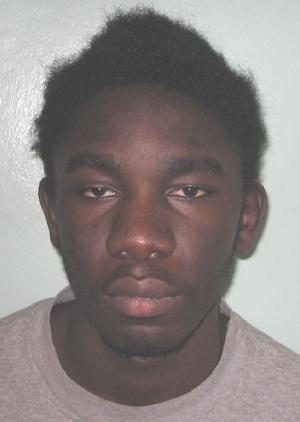- Home
- Forums
- News links for NNN Editor
- Commentary on news topics above
- Tower of Techno-babble and Mass Hypnosis
You are using an out of date browser. It may not display this or other websites correctly.
You should upgrade or use an alternative browser.
You should upgrade or use an alternative browser.
The NEW Black Hair Thread
- Thread starter veritas1616
- Start date
White Sail
Junior News Editor

Anthony David Brown
Rasp
Senior Editor
Wooly-sheboons cry "racism" over dung-hair
Six Flags Dreadlocks ”�’Extreme’ Racially-Charged Controversy in Largo Maryland
Two Africoon-Americoon shegroids are outraged over being turned down for a job at Six Flags because of their dreadlocks hairstyle.

Two Maryland sows are accusing Six Flags of discrimination after they were denied a job because of their dreadlocks.
According to reports, Janet Bello and Jackie Sherrill were denied a job at the Six Flags theme park in Largo, MD after the women refused to fit company standards by chopping off their dreads.
“I think it’s outrageous, and I really think it’s sad.”��� Bello said in an interview with ABC 7. According to Bello, Six Flags can literally just “go to hell.”���
Sherrill, who once worked for the theme park, claims she was asked to return to work but was dumbfounded when the park told her she to had to cut her dread’s off.
Since this story broke in the media, Six Flags released a statement saying that the company enforces a conservative grooming policy across all their parks and the policy does not permit certain hairstyles. The hairstyles that are not permitted include a variation of hair colors, dreadlocks, partially shaved heads, tails and hairstyles that impair an individual’s vision. Braided hair is allowed but they say it must be neat, in even rows and must not contain beads or any other ornaments.
Six Flags Dreadlocks ”�’Extreme’ Racially-Charged Controversy in Largo Maryland
Two Africoon-Americoon shegroids are outraged over being turned down for a job at Six Flags because of their dreadlocks hairstyle.

Two Maryland sows are accusing Six Flags of discrimination after they were denied a job because of their dreadlocks.
According to reports, Janet Bello and Jackie Sherrill were denied a job at the Six Flags theme park in Largo, MD after the women refused to fit company standards by chopping off their dreads.
“I think it’s outrageous, and I really think it’s sad.”��� Bello said in an interview with ABC 7. According to Bello, Six Flags can literally just “go to hell.”���
Sherrill, who once worked for the theme park, claims she was asked to return to work but was dumbfounded when the park told her she to had to cut her dread’s off.
Since this story broke in the media, Six Flags released a statement saying that the company enforces a conservative grooming policy across all their parks and the policy does not permit certain hairstyles. The hairstyles that are not permitted include a variation of hair colors, dreadlocks, partially shaved heads, tails and hairstyles that impair an individual’s vision. Braided hair is allowed but they say it must be neat, in even rows and must not contain beads or any other ornaments.
Rasp
Senior Editor
African Hair Braiders Say New Regulations Threaten Craft 
RALEIGH — African hair braiders in North Carolina will soon need a license to practice their craft.
As of July 1, North Carolina will become the 18th state to require women to carry a license to braid hair.
Braiders have a year — until July 1, 2011 — to take a written and practical exam administered by the North Carolina Board of Cosmetic Art Examiners. Those who fail must spend 300 hours and thousands of dollars at a cosmetology school to relearn a skill most braiders mastered as young children.
Anyone trying to enter the field after July 2011 will have to take the 300 class hours, without the opportunity to test out.
One problem: the vast majority of hair braiders emigrated from West Africa, and most can’t read or write English. Moreover, traditional African hair braiders do not use chemicals, so they say there’s no need to provide instruction on hygiene and other safety concerns that do not apply to their skills.
The national trade group representing African braiders says North Carolina’s law is little different from barriers placed on practitioners in states across the country; the primary complaints have not originated from customers but from licensed cosmetologists who see the braiders as unwelcome competition.
Requiring hair braiders to take formal exams smacks of a literacy test. “Back home, a lot of families don’t let their girls go to school,”�� said Mariama Diakhate, the owner of two African hair-braiding salons in Raleigh.
Diakhate, who is originally from Senegal, received a formal education because her dad served in the military, but six of her eight employees are illiterate. The two who can read and write do so in French.
Lynda Elliott, director of the state cosmetology board, confirmed the test would not be offered in French and that accommodations would not be made for those who can’t read.
“If you don’t know how to read or write, you don’t take classes,”�� Diakhate said. “You just pack your stuff and move out of North Carolina.”��
Diakhate said she, her sister, and her cousin will get licensed and do their best to keep the business running, but losing eight employees may force her to close her doors and move out of state as well.
Even if the braiders had the language skills necessary to pass the written exam (which Elliott said includes questions about hygiene, health, and braiding techniques), Diakhate says the practical exam and any classes on braiding are pointless.
“There is no school back home that teaches you how to braid,”�� she said. “Either you know how to do it, or you don’t know.”��
“It’s in our blood,”�� she added. “It’s our culture.”��
Diakhate began “braiding her dolls”�� when she was 7 or 8.
“I did my sisters’ hair,”�� she said. “They did mine.”��
Taalib-Din Uqdah, who has been referred to as the “Johnny Appleseed of hair braiding,”�� confirms this is the case.
Uqdah and his wife Pamela Ferrell own a prestigious hair-braiding salon in Washington, D.C., called Cornrows & Co. Ferrell, who is Diana Ross’ hair stylist, is considered the foremost authority on natural hair care, which includes braiding, twisting, and locking of hair.
The couple has trained dozens of women who’ve gone on to open their own salons.
In the 1980s the District of Columbia tried to shut them down, threatening them with fines and jail time for operating without a cosmetology license. After 10 years of battle, with help from the libertarian law firm Institute for Justice, the couple was able to exempt braiders from the local licensing law.
After his success, Uqdah formed the American Hairbraiders and Natural Haircare Association to help braiders nationwide fight regulations that threaten their livelihoods.
Uqdah advises braiders in North Carolina to “openly defy”�� the law. He says he and the Institute for Justice can help them fight and win.
Rep. Earline Parmon, a black Democrat from Forsyth County, said she introduced the licensing legislation for health and public safety reasons.
“Several of my cosmetologist constituents in Winston-Salem were seeing a lot of customers who had been to hair-braiding shops and were having all kinds of problems with hair breakage or chemicals that had been placed in their hair inappropriately,”�� Parmon said.
Uqdah says traditional braiders do not use chemicals of any kind. He said they use nothing more than “shampoo, a comb, and a little oil now and then.”��
Licensing laws rarely are created for the public good, said Uqdah. Rather, they are created to appease private interests who don’t like competition.
“Cosmetologists look at braiders as if they are taking money out of their pockets,”�� he said.
West African braiders are now learning to add extensions to white women’s hair, he said. White cosmetologists wanted to offer the services, but didn’t know how to braid. So they created other methods — gluing and singeing.
Uqdah said up to 25 percent of calls coming into salons are women asking for extensions, braiding, twisting, or locking services.
“If braiders weren’t making money, the cosmetology industry wouldn’t be concerned about them,”�� he said.
Parmon said no cosmetology association lobbied her before she introduced the legislation. She said the bill was prompted instead by individual complaints. However, she said, the complaints were not made by individuals with “damaged hair and scalps,”�� but by “licensed cosmetologists.”��
Diakhate and dozens of other salon owners have formed an association and plan to meet with Parmon and Rep. Larry Womble, another black Democrat from Winston-Salem who co-sponsored the bill.
Parmon said she wished the braiders had contacted her with their concerns before the legislation was passed.
Diakhate said a group of five women carpool from Virginia (where licensing is currently required) to have their hair braided in her shop. If she has to move, she believes her customers will follow her wherever she goes, “because that’s what they need.”��
“I don’t see a requirement for licenses putting [anybody] out of business,”�� Parmon said. “I would never do anything to cause people to lose their jobs or put people out of business, unless they’re so bad they need to be out of business.”��
Rasp
Senior Editor
Yolanda Titania Cartwright - Charge(s): None Div/Mb, None Fta For Arr: Ct1) Trespass After Warning, 843.15 Failure To Appear-Failure To Appear, None Fta For Sentencing Ct1) Offer To Commit Prostitution
Attachments
X
X-Negrologist
Guest
X
X-Negrologist
Guest

Sheeboon with odd mop top hair caught up in minor housing fraud.
Defendant: Elaine Sharpe
(Cook County Sheriff's Office photo / May 3, 2010)
Charge: Theft. From May 2003 until April 2009, she received federal housing subsidies from the Chicago Housing Authority and instead of living in her subsidized unit, she was rented it out.
X
X-Negrologist
Guest
Rasp
Senior Editor
http://www.newnation.co/
forums/attachment.php?attachmentid=1551&stc=1&d=1277851128
forums/attachment.php?attachmentid=1551&stc=1&d=1277851128
Cynthia R Scott - Charge(s): 843.15 Failure To Appear-Failure To Appear, None Fta For Arr // Ct1) Trespassing Property Not Structure Or Convey
Attachments
Rasp
Senior Editor

Reese, Crystal Lashaun
Gender: Female
Booked: Saturday, September 11th, 2010
Status: Presentenced
Charge(s):
Direct/transport For Purpose Prostituti
Prostitution (3rd+ Offense)
Arresting agency: ORANGE COUNTY SHERIFF OFFICE
Rasp
Senior Editor
Darkie told to shear its wool
Dreadlocks not permitted on homecoming court
VICKSBURG, MS (WLBT) – A week before Vicksburg High School's homecoming festivities several escorts found out that they would not be participating.

Patrick Richardson said he was told by school officials that his hair is keeping him from escorting one of the homecoming maids.
The sixteen-year-old is sad that he won't be in the next Vicksburg High School yearbook, pictured escorting his best friend Sa'shia Jones, who was chosen junior class maid.
Patrick said after paying to have a tux fitting last Thursday, the principal called him to the auditorium and told him that he could not be a homecoming escort because he wears dread-locked hair.
The junior was told he would have to cut it to be an escort.
"When I decided to grow my hair, that's what I wanted to do," Richardson said. "I thought it was acceptable, but from what the principal told me homecoming is of a higher standard and dreads are just not acceptable."
Patrick has been growing the dreadlocks since last October and said the hairstyle is not prohibited or addressed in any way in the school handbook.
Richardson's mother, Tammi Mason, said she is upset because her son's money was not refunded and that the school is not embracing his cultural expression.
"It's actually a form of discrimination to me, because if that's the case, then everybody who's fat shouldn't be able to be in it on the court," Mason said. "They could say anything. Actually, they could say you have to be a Size 10 to be one of the maids."
Richardson's dreadlocks are about eight inches long and were going to be braided and pulled back for this Friday's homecoming ceremonies.
Another Vicksburg High School parent, Lynda Jackson, told WLBT that her son De-Marcus Jackson, a freshman, also wears dreadlocks and was humiliated to find out that his hair will prevent him from escorting the sophomore maid.
Vicksburg Schools Superintendent Dr. Elizabeth Swinford said there's no written policy, but there is a practice that bans dreadlocks on the homecoming court.
She said students have been made aware of this, and school officials are in the process of looking at creating a written policy.
Mason and Lynda Jackson said they are looking into taking legal action, although it may be too late to help their sons' participation in this year's homecoming.
----------------
Student Banned From Homecoming Event Over Dreadlocks
Ebonics Alert!
Dreadlocks not permitted on homecoming court
VICKSBURG, MS (WLBT) – A week before Vicksburg High School's homecoming festivities several escorts found out that they would not be participating.

Patrick Richardson said he was told by school officials that his hair is keeping him from escorting one of the homecoming maids.
The sixteen-year-old is sad that he won't be in the next Vicksburg High School yearbook, pictured escorting his best friend Sa'shia Jones, who was chosen junior class maid.
Patrick said after paying to have a tux fitting last Thursday, the principal called him to the auditorium and told him that he could not be a homecoming escort because he wears dread-locked hair.
The junior was told he would have to cut it to be an escort.
"When I decided to grow my hair, that's what I wanted to do," Richardson said. "I thought it was acceptable, but from what the principal told me homecoming is of a higher standard and dreads are just not acceptable."
Patrick has been growing the dreadlocks since last October and said the hairstyle is not prohibited or addressed in any way in the school handbook.
Richardson's mother, Tammi Mason, said she is upset because her son's money was not refunded and that the school is not embracing his cultural expression.
"It's actually a form of discrimination to me, because if that's the case, then everybody who's fat shouldn't be able to be in it on the court," Mason said. "They could say anything. Actually, they could say you have to be a Size 10 to be one of the maids."
Richardson's dreadlocks are about eight inches long and were going to be braided and pulled back for this Friday's homecoming ceremonies.
Another Vicksburg High School parent, Lynda Jackson, told WLBT that her son De-Marcus Jackson, a freshman, also wears dreadlocks and was humiliated to find out that his hair will prevent him from escorting the sophomore maid.
Vicksburg Schools Superintendent Dr. Elizabeth Swinford said there's no written policy, but there is a practice that bans dreadlocks on the homecoming court.
She said students have been made aware of this, and school officials are in the process of looking at creating a written policy.
Mason and Lynda Jackson said they are looking into taking legal action, although it may be too late to help their sons' participation in this year's homecoming.
----------------
Student Banned From Homecoming Event Over Dreadlocks
Ebonics Alert!
“Mostly only people of the black race is known for having dreads and I feel like they are discriminating against the black race,”�� Richardson said. “I feel like, as long as your clothes are looking right, as long as your hair is looking neat, it shouldn't matter how your dreads look or how your hair looks.”��
Rasp
Senior Editor
Chimp arrested in connection with shooting at bar
http://www.newnation.co/
forums/attachment.php?attachmentid=2239&stc=1&d=1298820995
forums/attachment.php?attachmentid=2239&stc=1&d=1298820995
A 20-year-old man was arrested today in connection with a January shooting at Terry's Lounge in Chattanooga
Cordirrus Birt — who also goes by Cordirrus Jones — was arrested at 3212 Fourth Ave., said police spokeswoman Officer Rebecca Royval. He tried to run, she said, but was caught after a brief pursuit.
He was carrying a loaded 9 mm handgun when taken into custody, Royval said.
He is charged with attempted first-degree murder and aggravated assault in connection with the Jan. 21 shooting of 28-year-old Derrick Lewis. The shooting took place at Terry’s Lounge, located at 4010 Rossville Blvd.
Lewis' injuries were not life-threatening.
Birt was taken to the Hamilton County Jail, where he was charged with the two outstanding warrants and additional charges of unlawful carry or possessing a weapon, evading arrest and resisting a stop, frisk halt or arrest, Royval said.
Attachments
Nigtarded
Da TNB Reporter
Chicago woman accused of stealing hair
Feb. 3 at 2:05 p.m.

Shantiara Mitchell (Photo submitted by Oak Park police)
http://triblocal.com/oak-park-river-forest/2011/02/03/chicago-woman-accused-of-stealing-hair/
Feb. 3 at 2:05 p.m.

Shantiara Mitchell (Photo submitted by Oak Park police)
A Chicago woman is accused of trying to steal $20 in hair from an Oak Park business, according to police reports.
Oak Park police say Shantiara Mitchell, 22, of the 1600 block of North Long Street, was charged with theft and battery after hair was taken from Okay Beauty Supply Tuesday.
A woman walked into the shop, 8 Lake Street, at 4:26 p.m. Tuesday and began looking at the hair, police reports said. Oak Park Cmdr. LaDon Reynolds said the woman grabbed two $10 packages of Afrocity-brand hair weaves and put them in her purse. The store owner confronted her and she resisted, causing a laceration to the store owner’s face.
The woman fled the store and the owner was able to flag down a Chicago police officer, who was near the scene, which is near the border of Chicago and Oak Park. Chicago police detained Mitchell until Oak Park police arrived.
The hair was recovered and returned to the store.
http://triblocal.com/oak-park-river-forest/2011/02/03/chicago-woman-accused-of-stealing-hair/
















